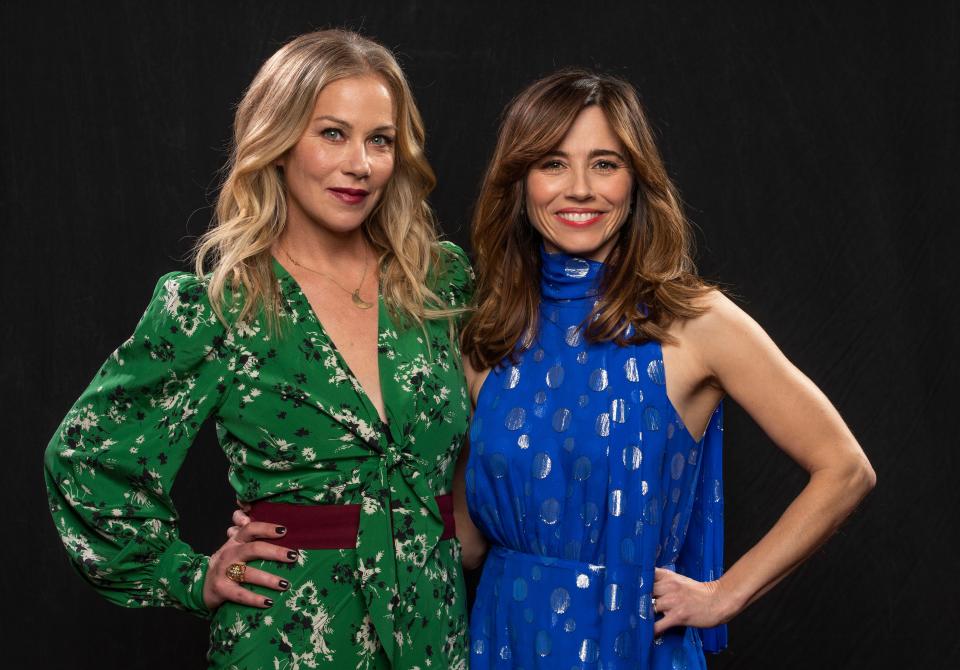'Dead to Me' stars on mom guilt, grief and why their Netflix show is so hard to talk about
Spoiler alert! Contains details about the first season of Netflix's "Dead to Me," now streaming.
NEW YORK – If you thought "Game of Thrones" spoilers were bad, try talking about "Dead to Me" with someone who's never seen it.
"It's like walking through a minefield of spoilers," says Linda Cardellini, 43, who co-stars with Christina Applegate in Netflix's dark new comedy series, released Friday. "But part of the fun of the show is there are so many unexpected turns and twists."
In the first episode, the abrasive Jen (Applegate) and carefree Judy (Cardellini) meet at a grief support group and become unlikely friends as they bond over the recent losses of their partners. But during a late-night visit to Judy's house, Jen is shocked to learn that Judy's fiance, Steve (James Marsden), is still very much alive. Digging herself into a deeper hole, Judy claims instead to be mourning five miscarriages, although we learn by episode's end that she actually killed Jen's husband, Ted, in a hit-and-run accident – a secret she struggles to keep from her new friend.
More: Review: Netflix's tragicomedy 'Dead to Me' is the best binge watch of 2019
Applegate, 47, who broke out on Fox's "Married ... with Children" in the late '80s, started developing "Dead" with "2 Broke Girls" writer Liz Feldman two years ago, after they scrapped a planned political comedy vehicle for the actress. Feldman points to recent series "Barry" and "Killing Eve" as inspirations, in that they are equal parts comedy and drama.
"A half-hour (show) doesn't have to be a straight-up comedy: There can be darkness, you can maybe even cry while watching," Feldman says.
Applegate and Cardellini – a TV veteran whose credits range from "Freaks and Geeks" and "ER" to "Bloodline" and "Mad Men" – say they were drawn to "Dead's" depiction of the imperfect, dryly funny stages of grief. Their characters get drunk together, spar with Ted's condescending mom (Valerie Mahaffey), and boldly confront the waitress Ted was cheating with at her restaurant. They even hook up with men they meet at a grief retreat, after a spirited night of "Carry-on-oke" singing.
"Grief can bring out the absurdities in life, and we all deal with it in our different ways," Applegate says. "Jen is grieving in her way, but it's hard, because people want to put a timeline on grief. It's like, 'OK, you've grieved enough now,' but she can't stop what she's feeling, which makes her even more angry and frustrated. I understood that, because that's happened in my life, too."

As mom to an 8-year-old daughter, Sadie Grace, with musician husband Martyn LeNoble, Applegate also understands Jen's "mom guilt." Her character's condescending mother-in-law and sons' teachers shame her for not being as attentive or outgoing as their late dad.
"As parents, innately, you feel like you're failing at everything all the time because no one says thank you," Applegate says. "No one says, 'You're doing a good job,' so I got that part of her. And no one is letting up; no one is letting her do what she needs to do to be OK, and that's why she behaves the way she does."
Judy's problems rapidly escalate throughout the season, as she moves into Jen's guesthouse and becomes a de facto member of the family. Further complicating matters: New evidence in Ted's accident prompts Jen to investigate his death in earnest, making it even more difficult for Judy to continue lying.
Although Judy is frequently selfish and erratic, she "ultimately wants this other person that she barely knows to be happy, and she's just trying to make this friendship work," Cardellini says.
The actresses credit Jen and Judy's complex dynamic to the large team of women behind the scenes: The writers are predominantly female, and eight of the first season's 10 episodes were directed by women.
"Oftentimes, female relationships (on screen) are skewed to the male perception of competition and cattiness," Applegate says. "But this had to be a sisterhood, because that's how women really are. Things may come up and we get angry, but we ultimately want to support and uplift and be there for our friends."
This article originally appeared on USA TODAY: 'Dead to Me' stars on mom guilt, grief and why their Netflix show is so hard to talk about

